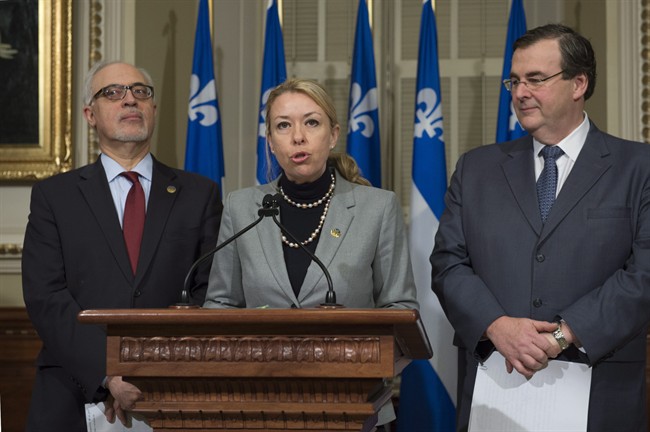Quebec Labour Minister Dominque Vien announced Wednesday that Quebec’s minimum wage would jump to $12 an hour as of May 1.

Vien said the 75-cent increase, from the current rate of $11.25, is the biggest jump in the minimum wage in Quebec’s history.
She also says Quebec’s thriving economy has helped the average hourly salary rise more quickly than anticipated, but said the increase was in line with a four-year-plan to have the minimum wage equivalent to 50 per cent of the average provincial hourly wage by 2020.
READ MORE: Average hourly wages in Canada have barely budged in 40 years
Vien said the increase was good news for low-income workers.
“This increase would improve the quality of life of low-income workers, encourage work incentives, increase disposable income and help reduce the incidence of poverty, without affecting employment and income, nor the competitiveness of our companies,” she said.
The raise represents between $462 and $979 a year in the pocketbooks of minimum wage earners, depending on hours worked and family situation.
READ MORE: Some Ontario Tim Hortons locations raise prices on breakfast menu after minimum wage hike
At $12, Quebec’s minimum wage would rank third highest in the country behind Alberta’s and Ontario’s.

Get breaking National news
Ontario raised its minimum hourly wage to $14 per hour on Jan. 1 and plans another increase to $15 next January.
- Carney unveils ‘Buy Canadian’ defence plan, says security can’t be a ‘hostage’
- Rhode Island shooter killed ex-wife, son before bystanders intervened: police
- Canadian immigration officers investigating hundreds identified by extortion task force
- ‘Canada can broker a bridge,’ Carney says on new trading bloc efforts
READ MORE: Tim Hortons protests and why the controversy has hit such a nerve with Canadians
Alberta’s minimum wage is expected to rise to $15 later this year.
But not everyone is welcoming the news.
The Conseil du patronant du Québec (CPQ) — a Quebec employers’ lobby group — argues that the move will hurt small businesses.
The CPQ said the 6.7 per cent increase outpaces inflation and the rise in the cost of living, making it difficult to absorb for businesses with small profit margins.
The Canadian Federation of Independent Business (CFIB) echoed the sentiment, explaining that to maintain pay equity among employees, small businesses will be under increased pressure in regards to payroll.
READ MORE: Minimum wage increase forces small-town grocery store to get creative when cutting costs
That, in turn, could force employers to compensate in other areas such as delaying hiring plans, cutting down on employee hours or increasing prices.
The CFIB expressed skepticism about the government’s approach.
“In the end, will workers at the bottom of the ladder really come out winners? Unfortunately, even if we stick to this goal, there are much better ways to fight poverty, ” said Martine Hébert, senior CFIB spokesperson.
READ MORE: Reality check: Is a $15 minimum wage bad for the economy?
Vien maintained the wage increase would directly benefit 352,900 employees across the province, including 214, 300 women.
In a statement, the CPQ cautioned political parties of all stripes to exercise caution before jumping on the $15-an-hour minimum wage bandwagon — especially in an election year.
“Any increase must respect employers’ ability to pay rather than a slogan such as $15 an hour pushed by certain social groups and which does not take into account the economic reality of Quebec society,” the statement reads.
For its part, the QuebecFederation of Labour, which represents about 600,000 workers, said the province could have done better.
The labour organization was behind a fight that began in May 2016 for a $15 minimum wage in the province — something Quebec wouldn’t commit to.
WATCH: Quebecers rally for $15 an hour minimum wage

— With files from the Canadian Press








Comments
Want to discuss? Please read our Commenting Policy first.